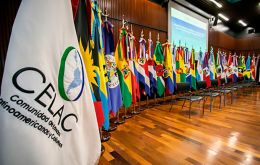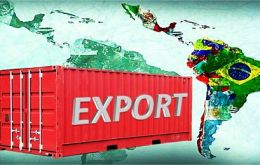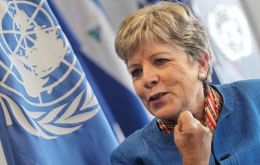MercoPress. South Atlantic News Agency
Tag: United Nations Economic Commission for Latin America and the Caribbean (ECLAC)
-
Wednesday, November 26th 2025 - 21:52 UTC
Latin America remains the world's most unequal region

The United Nations Economic Commission for Latin America and the Caribbean (ECLAC) warned in its latest report that Latin America continues to be the most unequal region globally, with extreme concentration of wealth stifling growth and social mobility.
-
Thursday, October 24th 2024 - 19:07 UTC
ECLAC foresees slight rebound in foreign trade

The United Nations Economic Commission for Latin America and the Caribbean (ECLAC) foresaw this week in its its annual Latin America and the Caribbean International Trade Outlook that regional exports of goods would bounce back in 2024 after last year's 1% contraction while service exports will complete their fourth consecutive year of double-digit growth.
-
Wednesday, January 24th 2024 - 10:14 UTC
UN body gathers in Chile to discuss labor issues

The United Nations Economic and Social Council (ECOSOC) Tuesday launched an appeal to intensify international cooperation and joint work in times of great global uncertainty, it was reported in Santiago de Chile, where the agency convened at the headquarters of the Economic Commission for Latin America and the Caribbean (ECLAC).
-
Wednesday, May 17th 2023 - 10:18 UTC
ECLAC calls for broader financing for Latin American countries

The Economic Commission for Latin America and the Caribbean (ECLAC) Tuesday said it considered that the current level of indebtedness in Latin America requires a transformation of the international financial architecture to offer countries other alternatives to attain “inclusive and sustainable” development.
-
Monday, April 24th 2023 - 16:53 UTC
ECLAC downgrades growth estimates to 1,2% this year for Latin America and the Caribbean

New projections released by the United Nations Economic Commission for Latin America and the Caribbean, ECLAC, estimate all sub-regions will experience lower growth this year compared with 2022.
-
Friday, July 6th 2018 - 08:12 UTC
FDI in Latin America falls for the third year running, says ECLAC

Despite an international context characterized by stronger growth in the global economy, abundant international liquidity, high corporate returns and optimism in financial markets, the flows of Foreign Direct Investment (FDI) in Latin America and the Caribbean – on average, and with great heterogeneity within the region – fell for the third year in a row in 2017 to total US$ 161.673 billion dollars, down 3.6% from the previous year and 20% below the level reached in 2011.
-
Friday, April 6th 2018 - 19:47 UTC
Regaining citizens’ trust in public institutions is key to resuming inclusive growth and well-being in Latin America and the Caribbean

Brussels, 09 April 2018 - Three out of four Latin Americans today show little or no confidence in their national governments. Around 80% think corruption is widespread. These levels are both up from 55% and 67% respectively in 2010. Mistrust is rising as in most regions of the world and risks deepening the disconnect between people and public institutions, harming social cohesion and weakening the social contract. Reconnecting public institutions with citizens by better responding to their demands is thus critical for strengthening growth and sustainable development in Latin America and the Caribbean (LAC) and for the well-being of the region’s citizens, according to the Latin American Economic Outlook 2018, Rethinking Institutions for Development. The region needs more transparent, capable, credible and innovative institutions if it wants to put itself on a higher and more inclusive development trajectory.
-
Wednesday, November 8th 2017 - 21:02 UTC
Latin America's exports expected to increase 10%, following four years of declining prices

In 2017 Latin America and the Caribbean will have left behind half a decade of prices decline of its export basket plus a weak increase in the exported volume, achieving an overall 10% growth in the value of its shipments abroad, according to new estimates released by ECLAC in Chile.
-
Friday, August 11th 2017 - 11:54 UTC
Foreign Direct Investment in Latin America drops for second year running

The flows of Foreign Direct Investment (FDI) into Latin America and the Caribbean shrank 7.9% in 2016 compared with 2015, totaling US$167.043 billion, representing a 17% decline from the peak reached in 2011, the Economic Commission for Latin America and the Caribbean (ECLAC) revealed at its headquarters in Santiago, Chile.
-
Friday, August 4th 2017 - 11:27 UTC
Latam and Caribbean forecasted to expand 1.1%, but South America, 0.6%

Latin America and Caribbean countries will grow 1.1% on average in 2017 after two consecutive years of contraction, thanks to an international context that shows improved growth expectations despite geopolitical risks, and better prices for the commodities that the region exports, according to a new annual report that ECLAC presented on Thursday in Santiago, Chile.
